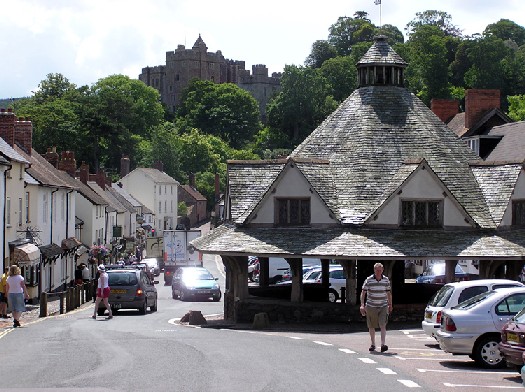 The above view shows the Yarn Market in the historic architectural gem of Dunster in Somerset.
The above view shows the Yarn Market in the historic architectural gem of Dunster in Somerset.
The medieval village is set to lose its iconic cobbled streets over health and safety fears, it has emerged today. The villagers are protesting.
This is not Dunster’s first battle with politicians determined to destroy part of his character.
During the English Civil War, Dunster was loyal to the King and the Castle was a Royalist garrison. It fell to the Parliamentarians in 1645. The victorious Parliamentarians intended the castle to be slighted (significantly demolished to prevent its future military use) However, this was not carried out, and the castle remained the garrison for Parliamentarian troops until 1650.
Today it s not the castle that is to be slighted but the cobble pavements. The council suggest that they are a danger to pedestrians and uncomfortable for wheelchair users. Local traders have refrained from repairing the cobbles outside their own premises for fear of being subsequently sued.
British Gazette comment: There are three issues here.
1. Preservation of the historic character of a significant tourist attraction.
2. Access for disabled persons.
3. The compensation culture.
So far as the first issue is concerned, the British Gazette is of the firm opinion that the cobble pavements should be repaired and preserved.
So far as the second issue is concerned the British Gazette feels that there has to be a balance struck between the rights of access of disabled persons and the character of a particular location. There will be no set formula but the British Gazette is of the firm opinion that in some cases the balance has swung too far in the favour of the disabled. We are in no doubt that this is a highly contentious statement! There are in fact many instances of historic buildings and locations which can not only be described as “not wheelchair friendly” but would fully justify the description of extremely wheelchair unfriendly. Does this mean that the historical and architectural character of such should be destroyed? The British Gazette says no. It should be recognised and accepted by disabled persons and their carers that there are places that the disabled would find it difficult and or uncomfortable to go and this is something they should accept. In fact, many do. The problem is with zealous officials and politicians.
So far as the third issue is concerned this has to be addressed. The most straightforward solution to this problem is to stop the contingency fee basis on which litigants can instruct solicitors and counsel. On an immediate and practical level the British Gazette offers this solution to the good people of Dunster and Somerset council:
That a company, limited by guarantee be set up and the ownership of the pavements be transferred to it. That members of the company will be whatever business or individual with property fronting onto the cobble pavements. That as members their maximum liability will be £1.00. That the council give sufficient money for the repair of the cobbles and thereafter future payments for maintenance when required. Ordinarily, the company should have no money in the bank. What would this mean? It would effectively end any legal claims for the solicitors who act on a contingency fee basis will only do so if there is a prospect of being paid out!
Speaking the Truth unto the Nation
